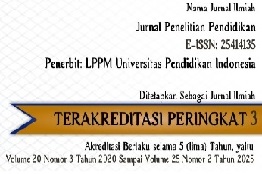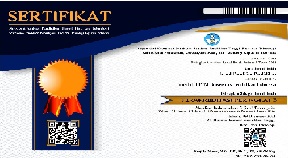Effectiveness of The Implementation Game-Based-Learning in Increasing Student Learning Outcomes
Abstract
The government has now started to lower the Implementation of Community Activity Restrictions level during the Covid-19 pandemic, but it cannot be predicted that it will return to normal. This makes the world of education to be able to choose a learning model whose implementation is flexible both offline and online. Learning outcomes are an indication of the success of a learning process. In line with the previous explanation, the purpose of this study is to determine the effectiveness of implementing Game-Based-Learning (GBL) learning-assisted Kahoot! with digital media in improving student learning outcomes in the subject of Construction Cost Estimation. This research is a pre-experimental design in the form of a one-group pretest-posttest research design. The results of the study show that the application of GBL produces an average score that is more effective than before the treatment, where the value obtained has exceeded the category of determining the completeness of learning outcomes for productive subjects that have been determined. To see the picture that GBL can improve student learning outcomes, it can be seen from the results of the test that the increase in N-Gain has increased with a moderate category. Based on the research findings and discussion in terms of the process and improvement of student learning outcomes, the N-Gain Score of 65.00% is categorized as quite effective, so the application of GBL can be applied according to current conditions and can be more optimal.
Keywords: Construction Cost Estimation, Game-Based-Learning (GBL), Kahoot!, Learning Outcomes
Full Text:
PDFReferences
Abidin, Z., Hudaya, A., & Anjani, D. (2020). Efektivitas pembelajaran jarak jauh pada masa pandemi covid-19. Research and Development Journal of Education, 1(1), 131.
All, A., Castellar, E. N. P., & Van Looy, J. (2021). Digital game-based learning effectiveness assessment: Reflections on study design. Computers and Education, 167(February 2020).
Arifin, F. (2021). Persepsi mahasiswa terhadap penggunaan kahoot sebagai media pembelajaran di stiabi riyadul ’ulum. Prosiding Seminar Nasional Ahlimedia, 1(1), 8–18.
Berbegal-Mirabent, J. Gil-Doménech, D.; Alegre, I. (2017). Where to locate? A project-based learning activity for a graduate-level course on operations management. The International Journal of Engineering Education, 33(5), .1586-1597.
BP, A. R., Munandar, S. A., Fitriani, A., Karlina, Y., & Yumrani. (2022). Pengertian pendidikan, ilmu pendidikan dan unsur-unsur pendidikan. Al Urwatul Wutsqa : Kajian Pendidikan Islam, 2(1), 1–8.
Chaiyo, Y., & Nokham, R. (2017). The effect of Kahoot, Quizizz and Google Forms on the student’s perception in the classrooms response system. 2nd Joint International Conference on Digital Arts, Media and Technology 2017: Digital Economy for Sustainable Growth, ICDAMT 2017, 178–182.
Cinta, A., Wibawa, P., Mumtaziah, H. Q., & Sholaihah, L. A. (2021). Game-based learning (gbl ) sebagai inovasi dan solusi percepatan adaptasi belajar pada masa new normal. INTEGRATED (Information Technology and Vocational Education),3(1), 17–22.
Cojocariu, V.-M., & Boghian, I. (2014). Teaching the relevance of game-based learning to preschool and primary teachers. Procedia - Social and Behavioral Sciences, 142, 640–646.
Daryanes, F., & Ririen, D. (2020). Efektivitas penggunaan aplikasi kahoot sebagai alat evaluasi pada mahasiswa. Journal of Natural Science and Integration, 3(2), 172-186.
Dewi, N. M. S., & Mudiasih, N. W. (2021). Belajar dari rumah (bdr) pada masa pandemi covid-19. PENSI: Jurnal Ilmiah Pendidikan Seni, 1(2), 1–7.
Dina Hakiky, L. B. (2020). Implementasi penggunaan media pembelajaran digital game based learning terhadap motivasi belajar dan keterampilan gerak dasar shooting bola basket. Jurnal Penelitian Pendidikan, 20(1), 72–82.
Erikson, M. G., & Erikson, M. (2019). Learning outcomes and critical thinking–good intentions in conflict. Studies in Higher Education, 44(12), 2293–2303.
Farnell, T., Skledar, N. M., & Schmidt, A. Š. (2021). The impact of COVID-19 on higher education: A review of emerging evidence. In European Commission.
Guardia, J. J., Luis, J., Olmo, D., Roa, I., & Berlanga, V. (2019). Innovation in the teaching-learning process : the case of Kahoot !. One The Horizon, 27(1), 35–45.
Gutiérrez-Puertas, L., Márquez-Hernández, V. V., Román-López, P., Rodríguez-Arrastia, M. J., Ropero-Padilla, C., & Molina-Torres, G. (2020). Escape rooms as a clinical evaluation method for nursing students. Clinical Simulation in Nursing, 49, 73–80.
Hidayat, R. (2018). Game-based-learning: Academic games sebagai metode penunjang pembelajaran kewirausahaan. Buletin Psikologi, 26(2), 71-85.
Intaha, A. M., Saputra, Y. M., & Mulyana, M. (2020). Pengaruh media pembelajaran poster dan video terhadap penguasaan keterampilan pencak. Jurnal Penelitian Pendidikan, 20(2), 145–153.
Iswardhany, R., & Rahayu, S. (2020). Pengaruh interaksi sosial guru dengan siswa terhadap motivasi belajar di jurusan teknik gambar bangunan SMK Negeri 1 Cilaku Cianjur. Jurnal Pendidikan Teknik Sipil, 2(2), 78–88.
Koeswanti, H. D. (2021). Optimization of online learning with a combination of offline practices in the post-pandemic era. International Journal of Elementary Education, 5(2), 315–322.
Kudri, A., & Maisharoh, M. (2021). Pengaruh media pembelajaran kahoot berbasis game based learning terhadap hasil belajar mahasiswa. Edukatif : Jurnal Ilmu Pendidikan, 3(6), 4628–4636.
Mustakim, M. (2020). Efektivitas pembelajaran daring menggunakan media online selama pandemi covid-19 pada mata pelajaran matematika. Al Asma : Journal of Islamic Education, 2(1), 1-12.
Prasetya, D., Learning, D. G., Anak, U., Dini, U., Prasetya, D. D., & Malang, U. N. (2013). Digital game-based learning untuk anak usia dini. Tekno, 20, 45–50.
Prawanti, L. T., & Sumarni, W. (2020). Kendala pembelajaran daring selama pandemic covid-19. Prosiding Seminar Nasional Pascasarjana UNNES, 286–291.
Rajabpur, A. (2021). Teachers ’ perception of advantages and disadvantages of Kahoot !. English Linguistics Research, 10(4), 49–61.
Ramdhani, F. (2018). Pelatihan penggunaan sofware structural analysis program (sap) pada struktur bangunan gedung di Sekolah Menengah Kejuruan Negeri 2 Dumai. Jurnal Pengabdian Masyarakat Multidisiplin, 1(1), 72–80.
Ritiauw, S. P., Mahananingtyas, E., Salamor, L., & Sayang, N. K. (2022). Pemanfaatan aplikasi ruang guru berbantuan zoom cloud meeting untuk meningkatkan hasil belajar siswa sekolah dasar. Research and Development Journal of Education, 8(1), 80-92.
Rofiah, M. D., & HS, M. S. (2021). Studi tentang model dan media pembelajaran pada mata pelajaran estimasi biaya konstruksi di SMK. Jurnal Kajian Pendidikan Teknik Bangunan (JKPTB), 7(2).
Samudera, S. A. (2020). Penggunaan Aplikasi Kahoot ! Sebagai Digital Game-Based Learning Pada Mata Pelajaran Sejarah Kebudayaan Islam ( SKI ) Di Madrasah Aliyah Pembangunan UIN Jakarta. Unpublished. Jakarta: UIN University.
Sanga, L., Purba, L., Sormin, E., & Harefa, N. (2019). Effectiveness of use of online games kahoot! chemical to improve student learning motivtion. Jurnal Pendidikan Kimia, 11(12), 57–66.
Sudaryat, Y. (2016). Mutu manajemen proses pembelajaran sekolah menengah kejuruan. Jurnal Penelitian Pendidikan, 14(1), 109-119.
Tavares, N. (2022). Nurse education today The use and impact of game-based learning on the learning experience and knowledge retention of nursing undergraduate students : A systematic literature review. Nurse Education Today, 117(March), 105484.
Wibawa, A. C. P., Mumtaziah, H. Q., Sholaihah, L. A., & Hikmawan, R. (2021). Game-based learning ( gbl ) sebagai inovasi dan solusi percepatan adaptasi belajar pada masa new normal. Integrated, 3(1), 17–22.
Winatha, K. R., & Setiawan, I. M. D. (2020). Pengaruh game-based learning terhadap motivasi dan prestasi belajar. Scholaria: Jurnal Pendidikan Dan Kebudayaan, 10(3), 198–206.
DOI: https://doi.org/10.17509/jpp.v22i3.50977
Refbacks
- There are currently no refbacks.
Copyright (c) 2022 Jurnal Penelitian Pendidikan


